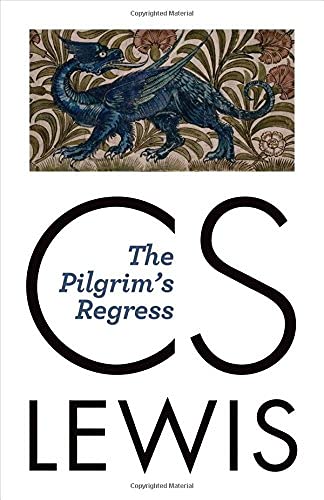The short-and-sweet summary of C.S. Lewis’s little known Pilgrim’s Regress.
The Pilgrim’s Regress is the sometimes very strange, sometimes startlingly true allegory that parallels Lewis’s own journey toward faith. Honestly, some of the book left me cold. It definitely doesn’t have the broad appeal of Bunyan’s Pilgrim’s Progress. [See my note below for Lewis’s explanation.] As in much of C.S. Lewis’s writing, though, occasionally one finds an insight that delves far beneath the surface-level thought many of us are content with today in our world of distraction. Whether or not the story rings true to me, Lewis is always a writer with whom I’m ready to spend some time and thought.
In chapter 7, Wisdom’s discussion of law is especially meaningful. When men shake off all rules, Wisdom claims, they find that all they really want is to be able to keep the rules.
“Why should we approve ourselves for keeping the rules unless we already thought the rules were good? A man may find pleasure in supposing himself swifter or stronger than he really is, but only if he already loves speed or strength.”
Wisdom, in C.S. Lewis’s Pilgrim’s Regress
Lewis’s summation of the Industrial Age (including its abandonment of studying the ancients and its reliance on machinery) could’ve been written by Wendell Berry, if Berry wrote allegory.
Note:
The afterword Lewis wrote ten years after writing this allegory helps clear some of the confusion I experienced in this book. His explanations of desire and his use (or misuse, he claims) of the term “Romanticism” are both helpful. His war experience also definitely shaped his thought patterns, especially in his youth.
Lewis makes it clear that the allegory is not an autobiography, but merely a story that became more personal to his own story than he at first realized when writing it. (He had realized that his winding path to conversion was not necessarily a common one.)
Favorite Quotes from The Pilgrim’s Regress
“Until you have it you will not know what you wanted.”
C.S. Lewis, chapter 8 of Pilgrim’s Regress
“…though the best is to have, the next best is to want…”
C.S. Lewis, chapter 10 of Pilgrim’s Regress
To read more book reviews/check out some of my book recommendations, click here.



 : a favorite place to walk when we can!
Once
: a favorite place to walk when we can!
Once 
![The first photos are of my parents’ sprawling rural Arkansas garden. The last is of my tiny little beds in the big city. Plants bring life to even the smallest corner!
I’ve been reading some beautiful fiction this year, and I just posted a review of a book by one of my favorite authors, Leif Enger. (https://therestfulhome.com/brave-young-handsome-review/ in your browser, or click on the link in my Instagram profile) If you don’t have time to read the book, though, here’s just a quote or two for your enjoyment:
🎼
“Death arrived easy as the train; [he] just climbed aboard, like the capable traveler he was.”
🛤️
On riding a horse: “You are a feeble and tenuous being; the only thing a horse wants from you is your absence.” 🐎 😄
#quotes #leifenger #amreading #gardens #gardening](https://scontent-atl3-1.cdninstagram.com/v/t39.30808-6/468657020_18342474787176025_4442629541396867851_n.jpg?_nc_cat=108&ccb=1-7&_nc_sid=18de74&_nc_ohc=DEja6UP2ct4Q7kNvgEYJxCM&_nc_zt=23&_nc_ht=scontent-atl3-1.cdninstagram.com&edm=ANo9K5cEAAAA&_nc_gid=AA4bBsvQ_JpqZXLUPUTpTC8&oh=00_AYCjI9LUx-cJxe6cu0n7H1Gounaz92aBlTrQacnKut8umg&oe=67567CAB)

















[…] The sometimes very strange, sometimes startlingly true allegory that parallels Lewis’s own journey toward faith. See my mini review here. […]